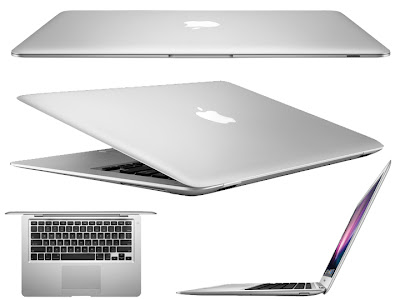Lets Compare MacBook and Ultrabooks in a slightly different angle. The source is once again PC Magazine and we just present an overall review about all features.
Although Apple's paper thin laptop has quite a bit in common with Intel Ultrabooks, in a few ways we describe below they are significantly different.
Source: PC Magazine
DESIGN
You can't ignore the Apple aesthetic the company's computers always look terrific, and the chic shape and sly silver coloring of the MacBook Air make it among the sharpest of all. Outward attractiveness is not an official part of Intel's ultrabook plan, so you may find something sparkling or something ordinary; it all depends on what choices the manufacturer makes.
COMPONENTS
Everything that goes into a MacBook Air or pretty much any other Apple computer, for that matter must meet Apple's strict requirements and interface properly with the OS X operating system, so every time you pick up an Apple computer you know what you're going to get. Many ultrabook manufacturers, on the other hand, want to keep costs down, and therefore exert less control over the hardware they include. This doesn't mean it will be inferior to what Apple uses, but it does mean that with ultrabooks, as with most other PCs, performance and compatibility characteristics are not as easy to predict. If you can, try before you buy to make sure the touchpad, keyboard, and general responsiveness are what you're looking for.
DISPLAY
The screen on the 11 inch MacBook Air maxes out at a resolution of 1,366 by 768, and the 13.3 inches display at 1,440 by 900. Those are decent specs, and the displays look good, but forget about watching full 1080p video on them, 720p is all they can handle. Most ultrabooks have screen resolutions similar to Apple's, but some out there are capable of displaying full 1080p (1,920 by 1,080) video.
Storage
All of Apple's MacBook Airs are loaded with from 64GB to 512GB of flash storage, making for incredible data access speeds; traditional spinning hard drives are not even an option on the Apple machines. Ultrabooks, however, can come with either, thus requiring the user to choose between storage that's plentiful, inexpensive, and slow, or limited, pricey, and very fast.
CONNECTORS
Any seriously diminutive system is going to have an extremely restricted port selection. What has really defined the MacBook Air to this point has been its Thunderbolt port, which combines PCI Express and Displayport protocols for high speed connections to devices as diverse as hard drives and external monitors, and is about as small as ports get. Thunderbolt ports haven't appeared on PC based ultrabooks yet, but it's only a matter of time until this changes.
HOW THIN AND LIGHT IS THE FUTURE?
As ultrabooks are scarcely more than a year old, it's tough at this point to see how they'll shake out long term. But despite some early stumbles and iffy sales numbers, the form is likely to hang on for a while maybe a long while. As computing devices grow smaller but users want larger amounts of power, they'll have to evolve to stay relevant. But because they're full, feature rich systems, they have more room to grow than is probably the case with even the best tablets and smartphones. Intel will undoubtedly face competition from other imitators, HP came out with an AMD based Sleekbook, for example but it will continue to dominate on the PC side for the time being.
Not that this means there's any chance the MacBook Air will go anywhere. One of Apple's defining (and most striking) products, it's still the first thing people think of when they think of ultrathin laptops and so far no Intel ultrabook has come close to changing that. The biggest threat to the MacBook Air is Apple itself; Can company devise something better to replace it? If not, expect it to continue receiving yearly updates that make it thinner, more powerful, and more exciting.
In any event, super thin laptops are here to stay, all that remains to be seen is where they go next. How much smaller and skinnier can they get? Time will tell, but with Intel and Apple leading the charge and squaring off against each other every step of the way consumers will only benefit by seeing computers that get ever more portable even as they get ever more powerful.












No comments:
Post a Comment